 There is a lot to be said about trains in China, especially if you are on one for 34 hours! We got ourselves hard sleeper tickets to Beijing. There are two other options which are the ordinary seats for shorter trips (now try that for 34 hours) and the soft sleepers which was sort of the first class tickets.Although called hard sleepers, the beds are not really that hard. There are six beds in each cabin, two on the ground level, two middle bunks and two on top. Prices slightly differ depending on the level. The ground level tickets from Fuzhou to Beijing were RMB458 while a middle bunk was about RMB15 cheaper. I wasn’t able to find out how much a top bunk costs.For the soft sleepers, there are just four beds to a cabin. The cabins seem slightly bigger and the beds are obviously softer. Aside from better beds and sheets, the ambiance is different since in the soft sleeper cabins, incandescent lights are used unlike the hard sleeper cabins which use fluorescent lights. The rest rooms are cleaner too. But tickets cost 40 to 50 percent more than the hard sleeper.
There is a lot to be said about trains in China, especially if you are on one for 34 hours! We got ourselves hard sleeper tickets to Beijing. There are two other options which are the ordinary seats for shorter trips (now try that for 34 hours) and the soft sleepers which was sort of the first class tickets.Although called hard sleepers, the beds are not really that hard. There are six beds in each cabin, two on the ground level, two middle bunks and two on top. Prices slightly differ depending on the level. The ground level tickets from Fuzhou to Beijing were RMB458 while a middle bunk was about RMB15 cheaper. I wasn’t able to find out how much a top bunk costs.For the soft sleepers, there are just four beds to a cabin. The cabins seem slightly bigger and the beds are obviously softer. Aside from better beds and sheets, the ambiance is different since in the soft sleeper cabins, incandescent lights are used unlike the hard sleeper cabins which use fluorescent lights. The rest rooms are cleaner too. But tickets cost 40 to 50 percent more than the hard sleeper.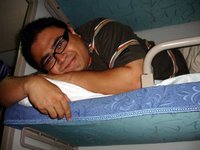 Now back to the hard sleepers. Each bunk is given a pillow and a comforter and has its own reading light. In each cabin is a thermos for hot water which is an essential since most passengers have instant noodles for their meals as well as tea. There is a restaurant on board but food is quite pricey. Each carriage has common squat toilets, lavatories as well as a continuous supply of potable hot water.Outside each cabin was a sort of table for eating and two retractable seats which are mostly for those in the upper bunks since you wouldn’t have a chance to sit down except if the one occupying the ground level bunk was your companion like in my case.
Now back to the hard sleepers. Each bunk is given a pillow and a comforter and has its own reading light. In each cabin is a thermos for hot water which is an essential since most passengers have instant noodles for their meals as well as tea. There is a restaurant on board but food is quite pricey. Each carriage has common squat toilets, lavatories as well as a continuous supply of potable hot water.Outside each cabin was a sort of table for eating and two retractable seats which are mostly for those in the upper bunks since you wouldn’t have a chance to sit down except if the one occupying the ground level bunk was your companion like in my case.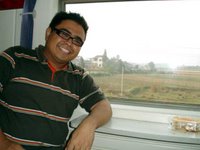 Once the train moves, the attendants do rounds of the cabins to collect the tickets and in return, give each passenger a plastic card corresponding to his or her bunk. This card is returned to the attendant shortly before reaching your destination and the attendant returns your ticket to you. You need to show the ticket when you exit the train station.The good thing about the plastic card practice is that the attendants are able to monitor the final destinations of each passenger and wake sleeping passengers up when they are nearing their destination in order to retrieve the plastic card. Thus, passengers do not miss their stops especially since the train arrives in the early hours of the morning in some stops.The long trip wasn’t bad at all. In fact, it was an opportunity for us to relax after the tight schedule of the camp. And the good thing about the trip was that we got to see the Chinese countryside. I was able to sleep quite well since the train moved smoothly and wasn’t shaking as much as we thought it would. And the irony was that I would wake up when the train stopped at a station which to me was weird since the train wasn’t moving at all.Well before we knew it, the train attendants woke us up since we were nearing Beijing.The first thing I did as soon as we arrived was to buy my ticket to Shanghai. The thing about China trains was that you could not book return tickets or tickets from other destinations since you had to buy your ticket from the station from which the train left. So tickets from Beijing to Shanghai had to be purchased in Beijing while my ticket from Shanghai back to Guangzhou had to be purchased in Shanghai.Now the problem there is the fact that you have to buy your tickets way in advance since the trips are usually fully-booked. So when I checked the ticket office, there were no more hard sleepers, just soft sleepers. So I had no choice but to get it which was okay with me since at least I could experience it too. I spent RMB499 for it, while a hard sleeper was about RMB150 less.
Once the train moves, the attendants do rounds of the cabins to collect the tickets and in return, give each passenger a plastic card corresponding to his or her bunk. This card is returned to the attendant shortly before reaching your destination and the attendant returns your ticket to you. You need to show the ticket when you exit the train station.The good thing about the plastic card practice is that the attendants are able to monitor the final destinations of each passenger and wake sleeping passengers up when they are nearing their destination in order to retrieve the plastic card. Thus, passengers do not miss their stops especially since the train arrives in the early hours of the morning in some stops.The long trip wasn’t bad at all. In fact, it was an opportunity for us to relax after the tight schedule of the camp. And the good thing about the trip was that we got to see the Chinese countryside. I was able to sleep quite well since the train moved smoothly and wasn’t shaking as much as we thought it would. And the irony was that I would wake up when the train stopped at a station which to me was weird since the train wasn’t moving at all.Well before we knew it, the train attendants woke us up since we were nearing Beijing.The first thing I did as soon as we arrived was to buy my ticket to Shanghai. The thing about China trains was that you could not book return tickets or tickets from other destinations since you had to buy your ticket from the station from which the train left. So tickets from Beijing to Shanghai had to be purchased in Beijing while my ticket from Shanghai back to Guangzhou had to be purchased in Shanghai.Now the problem there is the fact that you have to buy your tickets way in advance since the trips are usually fully-booked. So when I checked the ticket office, there were no more hard sleepers, just soft sleepers. So I had no choice but to get it which was okay with me since at least I could experience it too. I spent RMB499 for it, while a hard sleeper was about RMB150 less.
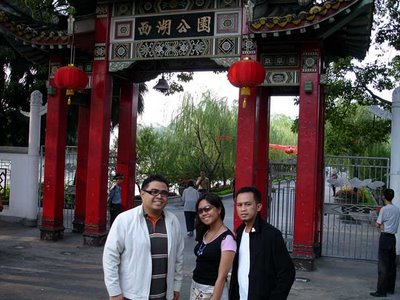 It’s our last day in Fuzhou. The program officially ended yesterday and the delegates will be heading home today. Our breakfast call time was 5:30 a.m. since the group had to leave by 6:10 a.m. to catch the flight back to Guangzhou.I was tired and sleepy from the previous night. After the farewell dinner, our Fujian hosts took the national leaders out for supper (meaning more food and drinks) at a hotel owned by one of the sponsors. And to think I was still stuffed from the lavish banquet prepared for us just two hours earlier.During supper, I had several shots of Chivas Regal since in China, it is rude to refuse a toast, more so from the hosts. And it is customary to reciprocate by offering a toast as well. When I got back to the hotel, I still did not go to bed since I joined the Singapore contingent at the KTV in the mezzanine for more drinks and some singing. Hehe! When the KTV closed at 2 a.m., I was still up since we were still chatting with other delegates in the room. I just remember that I could no longer keep my eyes open since we had been up late the previous nights, so I just excused myself and went straight to bed.
It’s our last day in Fuzhou. The program officially ended yesterday and the delegates will be heading home today. Our breakfast call time was 5:30 a.m. since the group had to leave by 6:10 a.m. to catch the flight back to Guangzhou.I was tired and sleepy from the previous night. After the farewell dinner, our Fujian hosts took the national leaders out for supper (meaning more food and drinks) at a hotel owned by one of the sponsors. And to think I was still stuffed from the lavish banquet prepared for us just two hours earlier.During supper, I had several shots of Chivas Regal since in China, it is rude to refuse a toast, more so from the hosts. And it is customary to reciprocate by offering a toast as well. When I got back to the hotel, I still did not go to bed since I joined the Singapore contingent at the KTV in the mezzanine for more drinks and some singing. Hehe! When the KTV closed at 2 a.m., I was still up since we were still chatting with other delegates in the room. I just remember that I could no longer keep my eyes open since we had been up late the previous nights, so I just excused myself and went straight to bed.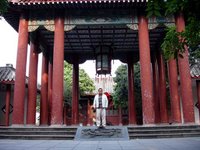 Although I did not have to wake up early since three of us were staying to catch an evening train to Beijing, I did anyway to say goodbye to everyone. It reminded me so much of SSEAYP since I also stayed behind in Singapore then since each participating country left a representative to attend the World Youth Meeting with delegates of the Ship for World Youth (SWY). It was funny watching everyone board the buses and waving as the buses left since it was as if we were just home and saying goodbye to our guests.
Although I did not have to wake up early since three of us were staying to catch an evening train to Beijing, I did anyway to say goodbye to everyone. It reminded me so much of SSEAYP since I also stayed behind in Singapore then since each participating country left a representative to attend the World Youth Meeting with delegates of the Ship for World Youth (SWY). It was funny watching everyone board the buses and waving as the buses left since it was as if we were just home and saying goodbye to our guests.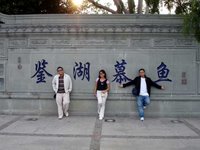 Anyway, I went straight to bed right after. Next thing I knew it was time for lunch so I packed my stuff and met up with the others at the restaurant below. We were planning to go to around in the afternoon. But shock hit us when we asked our guide Justin what time we would arrive in Beijing.Fuzhou is closer to Beijing than Guangzhou. We knew that the train from Guangzhou would take about 22 hours. And we were told that it would thus be shorter if we left from Fuzhou. So when Justin told us it was 34 hours, we just stood there in disbelief. It turns out, trains from this part of China had to navigate through mountains and thus, it took longer. Sigh! I just told the other two that the good thing about the situation was that instead of arriving in Beijing in the evening and having to spend for a hotel, we were going to arrive at 6 a.m. and thus, after freshening up, could already go around since we would have had enough sleep.
Anyway, I went straight to bed right after. Next thing I knew it was time for lunch so I packed my stuff and met up with the others at the restaurant below. We were planning to go to around in the afternoon. But shock hit us when we asked our guide Justin what time we would arrive in Beijing.Fuzhou is closer to Beijing than Guangzhou. We knew that the train from Guangzhou would take about 22 hours. And we were told that it would thus be shorter if we left from Fuzhou. So when Justin told us it was 34 hours, we just stood there in disbelief. It turns out, trains from this part of China had to navigate through mountains and thus, it took longer. Sigh! I just told the other two that the good thing about the situation was that instead of arriving in Beijing in the evening and having to spend for a hotel, we were going to arrive at 6 a.m. and thus, after freshening up, could already go around since we would have had enough sleep.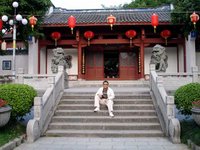 With that settled, we decided to shop for food for the 34 hour trip. But we decided to visit West Lake Park first which was just beside the hotel. The main attraction of the park is the two islands in the middle of the lake connected by old bridges. On one island was the sprawling villa of some rich person who lived several hundred years back.While walking around, we noticed some people in Chinese costumes from the imperial court. It turns out, the costumes were for rent. And excited to try them out, we went straight to the shop to find out that the rental fee was just RMB5 or roughly PHP35! Just great!
With that settled, we decided to shop for food for the 34 hour trip. But we decided to visit West Lake Park first which was just beside the hotel. The main attraction of the park is the two islands in the middle of the lake connected by old bridges. On one island was the sprawling villa of some rich person who lived several hundred years back.While walking around, we noticed some people in Chinese costumes from the imperial court. It turns out, the costumes were for rent. And excited to try them out, we went straight to the shop to find out that the rental fee was just RMB5 or roughly PHP35! Just great!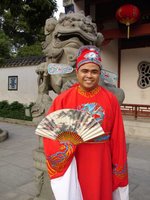 Although wearing the attire of the emperor would have been nice, I decided to wear a red robe because of the hat which accompanied it. It was the one with those propeller-like things sticking out of them. Hehe! I remember seeing them when I was a small kid watching those Chinese movies they played on local television long before. Turns out, it was worn by a member of the court who had topped the examination. We were kidding that when everyone else who had gone home found out about the costume shop, they would feel bad since it was right at the door step of the hotel.
Although wearing the attire of the emperor would have been nice, I decided to wear a red robe because of the hat which accompanied it. It was the one with those propeller-like things sticking out of them. Hehe! I remember seeing them when I was a small kid watching those Chinese movies they played on local television long before. Turns out, it was worn by a member of the court who had topped the examination. We were kidding that when everyone else who had gone home found out about the costume shop, they would feel bad since it was right at the door step of the hotel.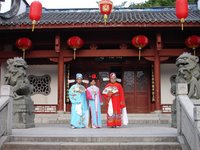 After the fun photo shoot, we rushed to the supermarket to get our food supplies. I got myself some bread with shredded pork, cup noodles, canned pork and 4 liters of water. I planned my menu in such a way that the heavy stuff was for when we were nearing Beijing so that I didn’t have to use the squat toilets while on the train. Haha!We went back to the hotel for dinner, still courtesy of our hosts, and to get our luggage. A vehicle was also arranged for us to take us to the train station. But as soon as we get on the train, we are on our own.
After the fun photo shoot, we rushed to the supermarket to get our food supplies. I got myself some bread with shredded pork, cup noodles, canned pork and 4 liters of water. I planned my menu in such a way that the heavy stuff was for when we were nearing Beijing so that I didn’t have to use the squat toilets while on the train. Haha!We went back to the hotel for dinner, still courtesy of our hosts, and to get our luggage. A vehicle was also arranged for us to take us to the train station. But as soon as we get on the train, we are on our own.
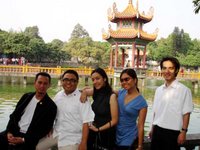 Today, we had a chance to go around Fuzhou, which is referred to as Rongcheng or the City of Banyan Trees which were planted in the city at the time of the Northern Song Dynasty (960-1127). First on our itinerary today was a visit to the Xichan Temple. Finally, after our close to a week's stay in China, we get to visit a centuries-old cultural structure. Good news for a heritage buff! Hehe! The temple was said to have been built in 867 A.D.
Today, we had a chance to go around Fuzhou, which is referred to as Rongcheng or the City of Banyan Trees which were planted in the city at the time of the Northern Song Dynasty (960-1127). First on our itinerary today was a visit to the Xichan Temple. Finally, after our close to a week's stay in China, we get to visit a centuries-old cultural structure. Good news for a heritage buff! Hehe! The temple was said to have been built in 867 A.D.
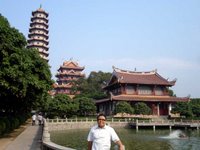 According to sources, the temple is in the west of Fuzhou, on the foot of Mount Yi. An ancient temple of the Tang Dynasty (618-907), Xichan is one of five Buddhist temples in the city. The most visible structure is its tall pagoda. Another feature of the temple is the many Litchi trees, planted in the Song Dynasty (960-1279). The visit to the temple was a good opportunity for many of us to relax and enjoy Chinese heritage, and for some of us, to retreat and reflect.
According to sources, the temple is in the west of Fuzhou, on the foot of Mount Yi. An ancient temple of the Tang Dynasty (618-907), Xichan is one of five Buddhist temples in the city. The most visible structure is its tall pagoda. Another feature of the temple is the many Litchi trees, planted in the Song Dynasty (960-1279). The visit to the temple was a good opportunity for many of us to relax and enjoy Chinese heritage, and for some of us, to retreat and reflect.
After the short tour, we then visited some enterprises based in Fuzhou such as the Fujian Jindeli Holdings Corporation which produces jewelry, as well as the Fujian Star-net Communications Company. Lunch was at the Rongquiao Riverview Hotel were a huge buffet awaited us. There was just too much food from the usual Chinese food, to sushi, shabu-shabu, and grilled meats. I really had to control my appetite since I didn't want to gain weight during the trip. Hehe!
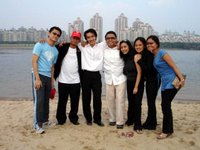 This was followed by a visit to the Ninghua Youth Civilization Community to observe volunteer work being done by the group in a community composed mostly of senior citizens. Again, the main discussion point of the camp was volunteerism and I do hope we could strengthen that here.
This was followed by a visit to the Ninghua Youth Civilization Community to observe volunteer work being done by the group in a community composed mostly of senior citizens. Again, the main discussion point of the camp was volunteerism and I do hope we could strengthen that here.
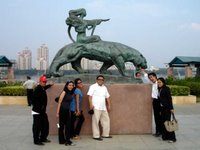 Our last stop was a few minutes at the Fuzhou Riverside Park. There are just so many parks and open spaces in China. Really great for the standard of living. In Metro Manila, we only have a few open spaces left and some mayor is even attempting to chop down the last urban forest in his jurisdiction. I wonder what runs in his mind when he gets all these crazy ideas. I think mayors here should have the political will to reclaim open spaces such as old plazas and parks that used to be a highlight of Manila at the turn of the past century.
Our last stop was a few minutes at the Fuzhou Riverside Park. There are just so many parks and open spaces in China. Really great for the standard of living. In Metro Manila, we only have a few open spaces left and some mayor is even attempting to chop down the last urban forest in his jurisdiction. I wonder what runs in his mind when he gets all these crazy ideas. I think mayors here should have the political will to reclaim open spaces such as old plazas and parks that used to be a highlight of Manila at the turn of the past century.
 We then trooped back to the hotel to prepare for a very formal courtesy call to the leaders of Fujian province. And just to let you know, Chinese provinces are as big as countries! In fact, the Philippines is just slightly larger than Guangxi. Mainland China, with its land area of 9.5 million square kilometers just has 22 provinces, five autonomous regions and four independent municipalities. In fact, many Chinese cities are bigger than our provinces which I why I wonder where some people in Davao City got the idea that they are the biggest city in the world in terms of land area. Shanghai, China's biggest city, is a little over two times the size of Davao City at 6,340.5 square kilometers.
We then trooped back to the hotel to prepare for a very formal courtesy call to the leaders of Fujian province. And just to let you know, Chinese provinces are as big as countries! In fact, the Philippines is just slightly larger than Guangxi. Mainland China, with its land area of 9.5 million square kilometers just has 22 provinces, five autonomous regions and four independent municipalities. In fact, many Chinese cities are bigger than our provinces which I why I wonder where some people in Davao City got the idea that they are the biggest city in the world in terms of land area. Shanghai, China's biggest city, is a little over two times the size of Davao City at 6,340.5 square kilometers.
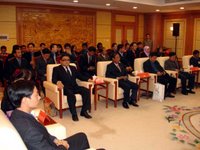 Compare the China figures to the 79 provinces of the Philippines in just 300,000 square kilometers! I feel the Philippines is just too fragmented, where a few small municipalities can constitute a province. As a result, there is no coordinated development effort with each governor having his own preferences, whims and caprices and the result is a chopsuey urban landscape. In fact, as I speak, votes are being counted for the creation of the new province of Shariff Kabunsuan, the 80th province, which is almost sure of approval by Maguindanao voters. Obviously, this creates more positions up for grabs for our politicians. I feel that this practice has to be stopped and that we should be doing the opposite which is fusing together small political units to halt the chopsuey development. Oh well!
Compare the China figures to the 79 provinces of the Philippines in just 300,000 square kilometers! I feel the Philippines is just too fragmented, where a few small municipalities can constitute a province. As a result, there is no coordinated development effort with each governor having his own preferences, whims and caprices and the result is a chopsuey urban landscape. In fact, as I speak, votes are being counted for the creation of the new province of Shariff Kabunsuan, the 80th province, which is almost sure of approval by Maguindanao voters. Obviously, this creates more positions up for grabs for our politicians. I feel that this practice has to be stopped and that we should be doing the opposite which is fusing together small political units to halt the chopsuey development. Oh well!
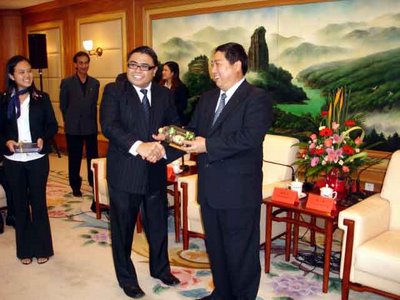 Enough with the digression. So going back, we met up with Mr. Chen Shaoyong, the Secretary-General of the Fujian Provincial Standing Committee of the Communist Party of China, the no. 2 man in Fujian.
Enough with the digression. So going back, we met up with Mr. Chen Shaoyong, the Secretary-General of the Fujian Provincial Standing Committee of the Communist Party of China, the no. 2 man in Fujian.
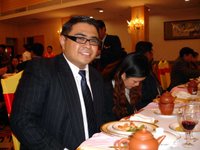 A dinner banquet followed at another five-star hotel. I feel this banquet was the most lavish of them all since they brought out some exotic-looking dishes. Wasn't able to note down all the dishes since the menu was in Chinese.
A dinner banquet followed at another five-star hotel. I feel this banquet was the most lavish of them all since they brought out some exotic-looking dishes. Wasn't able to note down all the dishes since the menu was in Chinese.
This was the last activity of the China-ASEAN Youth Camp 2006 so it served as a farewell party as well. More toasts were exchanged as a tribute to the strong cooperation among nations. To end the evening, the entire ballroom sang the Chinese and original versions of Auld Lang Syne. This song gives me the goosebumps since it was always played for our emotional farewells in the Ship for Southeast Asian Youth Program which I participated in way back in 2002.
 According to sources, the words Auld Lang Syne literally translates from the old Scottish dialect meaning Old Long Ago and is about love and friendship in times past. The part of the song which goes "We'll take a Cup of Kindness yet" relates to a drink shared by men and women to symbolise friendship. So there, a fitting finale to a week of cultural exchange between neighbors.
According to sources, the words Auld Lang Syne literally translates from the old Scottish dialect meaning Old Long Ago and is about love and friendship in times past. The part of the song which goes "We'll take a Cup of Kindness yet" relates to a drink shared by men and women to symbolise friendship. So there, a fitting finale to a week of cultural exchange between neighbors.
Our great China adventure begins tomorrow. While the other delegates go back home to their own countries, three of us decided to make the most of our China trip by visiting Beijing.
 There is a lot to be said about trains in China, especially if you are on one for 34 hours! We got ourselves hard sleeper tickets to Beijing. There are two other options which are the ordinary seats for shorter trips (now try that for 34 hours) and the soft sleepers which was sort of the first class tickets.
There is a lot to be said about trains in China, especially if you are on one for 34 hours! We got ourselves hard sleeper tickets to Beijing. There are two other options which are the ordinary seats for shorter trips (now try that for 34 hours) and the soft sleepers which was sort of the first class tickets. Now back to the hard sleepers. Each bunk is given a pillow and a comforter and has its own reading light. In each cabin is a thermos for hot water which is an essential since most passengers have instant noodles for their meals as well as tea. There is a restaurant on board but food is quite pricey. Each carriage has common squat toilets, lavatories as well as a continuous supply of potable hot water.
Now back to the hard sleepers. Each bunk is given a pillow and a comforter and has its own reading light. In each cabin is a thermos for hot water which is an essential since most passengers have instant noodles for their meals as well as tea. There is a restaurant on board but food is quite pricey. Each carriage has common squat toilets, lavatories as well as a continuous supply of potable hot water. Once the train moves, the attendants do rounds of the cabins to collect the tickets and in return, give each passenger a plastic card corresponding to his or her bunk. This card is returned to the attendant shortly before reaching your destination and the attendant returns your ticket to you. You need to show the ticket when you exit the train station.
Once the train moves, the attendants do rounds of the cabins to collect the tickets and in return, give each passenger a plastic card corresponding to his or her bunk. This card is returned to the attendant shortly before reaching your destination and the attendant returns your ticket to you. You need to show the ticket when you exit the train station.














